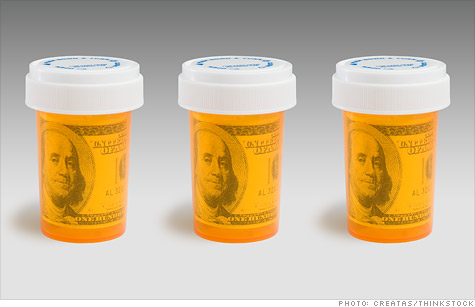Search News

NEW YORK (CNNMoney) -- Like a nasty bug, a new fraud is spreading through the health care system. Criminal enterprises posing as pharmacies are billing Medicare, Medicaid and private insurers for fake prescriptions and bilking health care out of millions of dollars, federal officials say.
"These scams are exploding. They're a huge issue for the department," said Shimon Richmond, a field agent with the Department of Health and Human Services.
It's not clear exactly how much money is being drained from the system by so-called "phantom pharmacy" schemes, but health care fraud already costs taxpayers and insurers more than $60 billion a year, federal officials say. Fraud is a key factor contributing to rising health care costs, they say.
Here's how the scheme typically works, according to experts: Criminals use a legitimate address to establish a fake pharmacy business -- which is essentially a shell operation.
Then, using stolen or otherwise-misgotten doctor ID and patient insurance ID numbers, scammers write fraudulent prescriptions for expensive drugs that were never actually prescribed or dispensed.
Next, they submit these fake prescriptions for reimbursement to insurers, Medicare or Medicaid -- for hefty returns. In a single claim, a fake pharmacy can make anywhere from $2,000 to $8,000, said Richmond, who's been investigating phantom pharmacy schemes in Florida for two years.
"These scams are 100% fraud, and we're seeing more and more of them," said Gary Cantrell, assistant inspector general for investigations with HHS. His office is pursuing hundreds of phantom pharmacy cases.
Short-term gains: But regulators are having a tough time cracking down, because phantom pharmacies operate quickly and quietly. They may operate for as little as 60 days or as long as eight months, then disappear and pop up at a new address.
"Criminals quickly make large amounts of money, then close up and open up a new scam somewhere else," said Cantrell.
Another challenge for fraud-fighters: Since Medicare currently requires pharmacies to be reimbursed quickly -- sometimes in as little as two weeks -- fake claims may be paid out before they can be validated.
But even private insurers, which typically are better at preventing fraud, are falling victim to these schemes, federal officials say.
Phantom pharmacies also have a wider geographic reach than most other health-care scams, officials say. Scammers typically target Florida and California because they have large Medicare and Medicaid populations. But phantom pharmacies are spreading beyond these borders, they say, showing up in cities like Detroit, New York and Dallas.
Another obstacle for regulators is that trained health-care professionals may participate in the schemes. In some cases, corrupt doctors write prescriptions, or legitimate pharmacists operate a "phantom" business on the side, experts say.
Organized crime rings may also play a role. In one case, a group of people went to pharmacy school, then opened legitimate drugstores. Then they opened phantom pharmacies as well. Profits from these operations may flow overseas to fund money-laundering schemes, Richmond says.
"I've been in law enforcement for over 10 years," said Richmond. "There's just not enough of us to address this problem." ![]()
| Overnight Avg Rate | Latest | Change | Last Week |
|---|---|---|---|
| 30 yr fixed | 3.80% | 3.88% | |
| 15 yr fixed | 3.20% | 3.23% | |
| 5/1 ARM | 3.84% | 3.88% | |
| 30 yr refi | 3.82% | 3.93% | |
| 15 yr refi | 3.20% | 3.23% |
Today's featured rates:
| Latest Report | Next Update |
|---|---|
| Home prices | Aug 28 |
| Consumer confidence | Aug 28 |
| GDP | Aug 29 |
| Manufacturing (ISM) | Sept 4 |
| Jobs | Sept 7 |
| Inflation (CPI) | Sept 14 |
| Retail sales | Sept 14 |